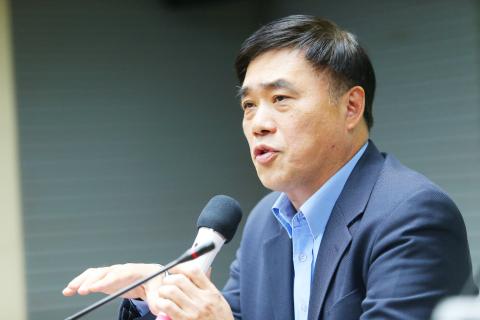Former Chinese Nationalist Party (KMT) vice chairman Hau Lung-bin (郝龍斌) yesterday announced his bid for the KMT chairmanship, saying he would endeavor to close the gap between the party and the people if elected.
“The disastrous defeat of the KMT in two elections in a row has unnerved its supporters. Many younger KMT members have proposed reform plans in the hopes of rebuilding and bettering the party,” Hau told an impromptu news conference in Taipei yesterday evening.
Hau said following the KMT’s loss in the 2014 nine-in-one elections, he had worked to rebuild the party’s brand and cultivate young talent in his capacity as the vice chairman — a position he held from April 2014 until Saturday, when he stepped down after failing to secure a legislative seat in Keelung.

Photo: CNA
Nevertheless, voters used their ballots to tell the KMT that the scope of its reforms were not extensive, efficient and good enough, Hau said, adding that the gap between the KMT leadership and its local branches also contributed to the party’s defeat.
“Other reasons include the KMT’s failure to be in sync with people’s needs and volatile social trends. From 7.65 million votes in the 2008 presidential race to 3.81 million votes last weekend, the party has lost more than 3 million votes in the past few weeks,” the former Taipei Mayor said.
“We must act fast to regain those ‘vanishing votes’ before they are gone forever,” he said.
Asked whether he regarded himself as a better fit for the party’s chairmanship than Deputy Legislative Speaker Hung Hsiu-chu (洪秀柱), who entered the by-election for the KMT leadership on Wednesday, Hau said they sought different paths for the party in terms of cross-strait ties, without elaborating.
Hau said he only publicly endorsed Hung she was later replaced by former KMT chairman Eric Chu (朱立倫) as the KMT’s presidential candidate in October last year out of respect for the party’s democratic primary mechanism.
With regard to Vice President Wu Den-yih’s (吳敦義) reported interest in entering the by-election, Hau said Wu had a better grasp of Taiwan’s local conditions, particularly in central and southern parts of the nation.
“If Vice President Wu is able to convince me that the path he envisions for the KMT is better than mine, then I am willing to give him my support in the March 26 election,” Hau said.

PRAISE: Japanese visitor Takashi Kubota said the Taiwanese temple architecture images showcased in the AI Art Gallery were the most impressive displays he saw Taiwan does not have an official pavilion at the World Expo in Osaka, Japan, because of its diplomatic predicament, but the government-backed Tech World pavilion is drawing interest with its unique recreations of works by Taiwanese artists. The pavilion features an artificial intelligence (AI)-based art gallery showcasing works of famous Taiwanese artists from the Japanese colonial period using innovative technologies. Among its main simulated displays are Eastern gouache paintings by Chen Chin (陳進), Lin Yu-shan (林玉山) and Kuo Hsueh-hu (郭雪湖), who were the three young Taiwanese painters selected for the East Asian Painting exhibition in 1927. Gouache is a water-based

A magnitude 4.1 earthquake struck eastern Taiwan's Hualien County at 2:23pm today, according to the Central Weather Administration (CWA). The epicenter of the temblor was 5.4 kilometers northeast of Hualien County Hall, at a depth of 34.9 km, according to the CWA. The earthquake's intensity, which gauges the actual effect of a temblor, was the highest in Hualien County, where it measured 2 on Taiwan's 7-tier intensity scale. The quake also measured an intensity of 1 in Yilan county, Taichung, Nantou County, Changhua County and Yunlin County, the CWA said. There were no immediate reports of damage or injuries.

OFF-TARGET: More than 30,000 participants were expected to take part in the Games next month, but only 6,550 foreign and 19,400 Taiwanese athletes have registered Taipei city councilors yesterday blasted the organizers of next month’s World Masters Games over sudden timetable and venue changes, which they said have caused thousands of participants to back out of the international sporting event, among other organizational issues. They also cited visa delays and political interference by China as reasons many foreign athletes are requesting refunds for the event, to be held from May 17 to 30. Jointly organized by the Taipei and New Taipei City governments, the games have been rocked by numerous controversies since preparations began in 2020. Taipei City Councilor Lin Yen-feng (林延鳳) said yesterday that new measures by

President William Lai (賴清德) has appointed former vice president Chen Chien-jen (陳建仁) to attend the late Pope Francis’ funeral at the Vatican City on Saturday on his behalf, the Ministry of Foreign Affairs said today. The Holy See announced Francis’ funeral would take place on Saturday at 10am in St Peter’s Square. The ministry expressed condolences over Francis’ passing and said that Chen would represent Taiwan at the funeral and offer condolences in person. Taiwan and the Vatican have a long-standing and close diplomatic relationship, the ministry said. Both sides agreed to have Chen represent Taiwan at the funeral, given his Catholic identity and